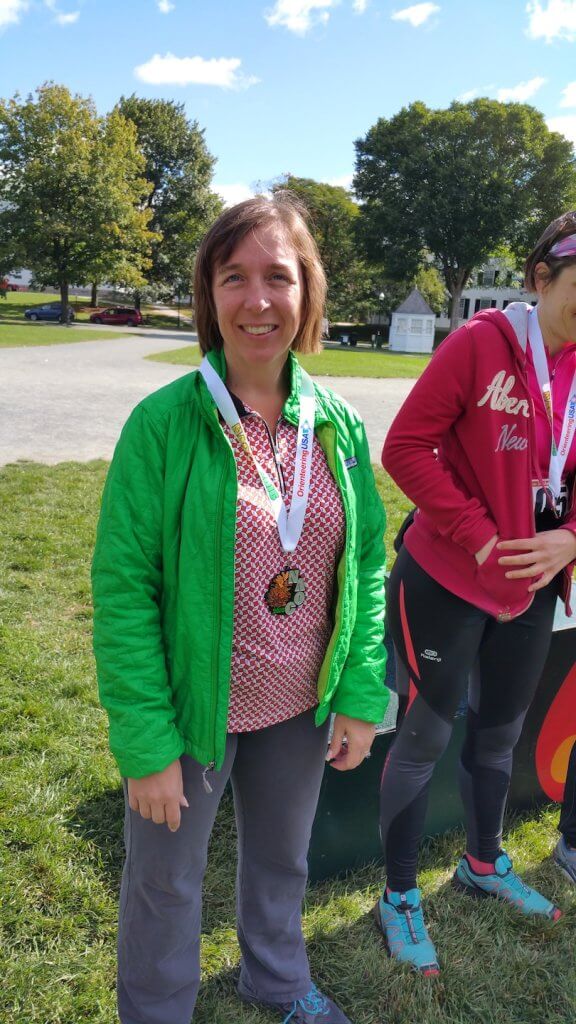
This is a transcript of an interview with Stephanie in January, 2025. It has been edited for clarity and length.
Cristina Luis: Right, let’s start with an introduction.
Stephanie Ross: I am Stephanie Ross and I live in Northern Kentucky, just a little south of Cincinnati. And my home club is Orienteering Cincinnati [OCIN].
Ok, now I would like to hear your orienteering origin story.
I came to orienteering because I needed to learn how to navigate in order to be a better adventure racer. And I think I first started orienteering probably in 2004, I would guess. I did my first adventure race in 2002 and directed my first adventure race in 2003. I thought that because I’ve done one, I must be able to create one.
That’s the confidence all organizers need.
Yeah, overconfidence. I think that I met some adventure racers who did orienteering as well, and they introduced me to orienteering and that was probably 2004ish.
So, I say that I’ve been orienteering for about 21 years and probably have been active with OCIN as a volunteer probably since 2007.
And what keeps you orienteering?
Well, I guess I love orienteering because it’s something that you can just continually improve on. You just are never perfect at orienteering and so there’s room for constant improvement and growth, especially when you go other places. I love to orienteer on vacation and orienteer on different maps, different terrain because that’s just a constant learning experience. So that’s a lot of fun. And because of course the longer you do it, the better you get. It helps make up for some of the physical decline. I’m getting slower.
Yeah, I’m getting physically slower than I’ve ever been and yet, I can still be somewhat competitive in my age group because my navigation just continues to improve over the years. And I’ve always liked logic puzzles and I’ve always enjoyed puzzle games and orienteering kind of feels like that to me.
It’s interesting how many people who orienteer are sort of perfectionists because it’s so hard to be perfect. You’re like “if only I could have a perfect run” and it just never happens.
Yeah. Yeah, it’s true. Another thing actually that I should mention about why I love orienteering is because it is now what my husband Ben and I do together. It’s “our thing.”
You mentioned that you like to orienteer on vacation. What are your favorite orienteering vacations?
So Five Days of Italy, the year that World Masters was in Italy, just a couple years ago, whenever it was right before World Masters. And World Masters was great, but the Five Days of Italy was in the Dolomites and that was just such a spectacular venue. It was amazing and the orienteering was terrific. We also really enjoyed a recreational orienteering week in Iceland. We did that on our way to World Masters in Denmark, I think.
2018.
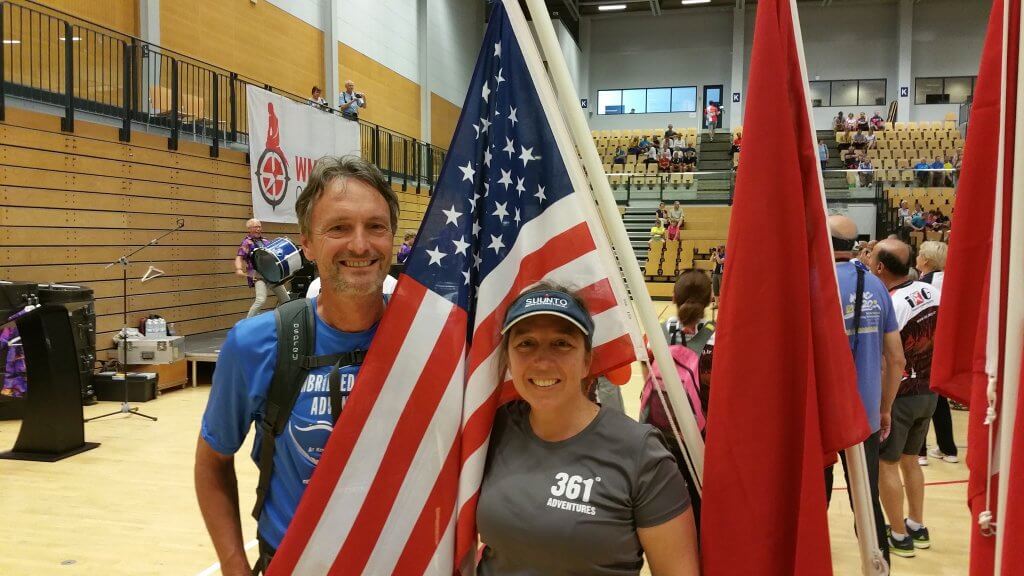
Yeah that sounds right. And orienteering on a lava field was really unique and spectacular. And then my other favorite, and I’m not saying this just because you’re the one asking… You can ask anybody, I say this every time. I love orienteering in the desert. And so Southwest Spring Week is one of my favorite orienteering events.
Totally not a plant. I did not pick you for that reason to go first.
But I mean, we’re coming back this year for the third time.
Well, and that’s why. There aren’t a lot of places that we go to repeatedly like that because it’s a big world. There’s lots of places to go and places we want to see, but we love coming back to Arizona because I just think orienteering in the desert is spectacular. It uses such a different skill set than we use orienteering in Kentucky and Ohio in our ridge and valley system.
And you get a lot less muddy.
It’s true. When I talk about where we’re going to retire to, one of the things–my mom laughed at me. I said, I want to retire someplace where I can lay down on the ground and not get eaten up by bugs and just like I want to live in the desert basically is what I’m saying without coming out and saying that. She’s like, “Why do you want to live someplace you can just lay on the ground, what does that even mean?” I’m like, “No, I don’t want things crawling on me.”
You don’t want chiggers
I don’t want all those things. I just want to be able to lay down on the ground and take a nap.
I think that’s valid. That is good. Hashtag lifegoals.
Yeah, if you do adventure racing, you probably understand that better because we end up laying on the ground a lot.
That’s true. There are a lot of photos of adventure racers just laying on the ground and
Exactly.
–and not in the way an orienteer does with the Euro flop after you finish. It’s not like that with adventure racers. It’s time for a nap or like one of your teammates is fixing their bike tube so you’re just laying there.
You’re just catching Z’s whenever you can. Curled up in a fetal position with your bike helmet on.
Right, yeah! There’s a lot of pictures of people with mud and a bike helmet, like on the ground.
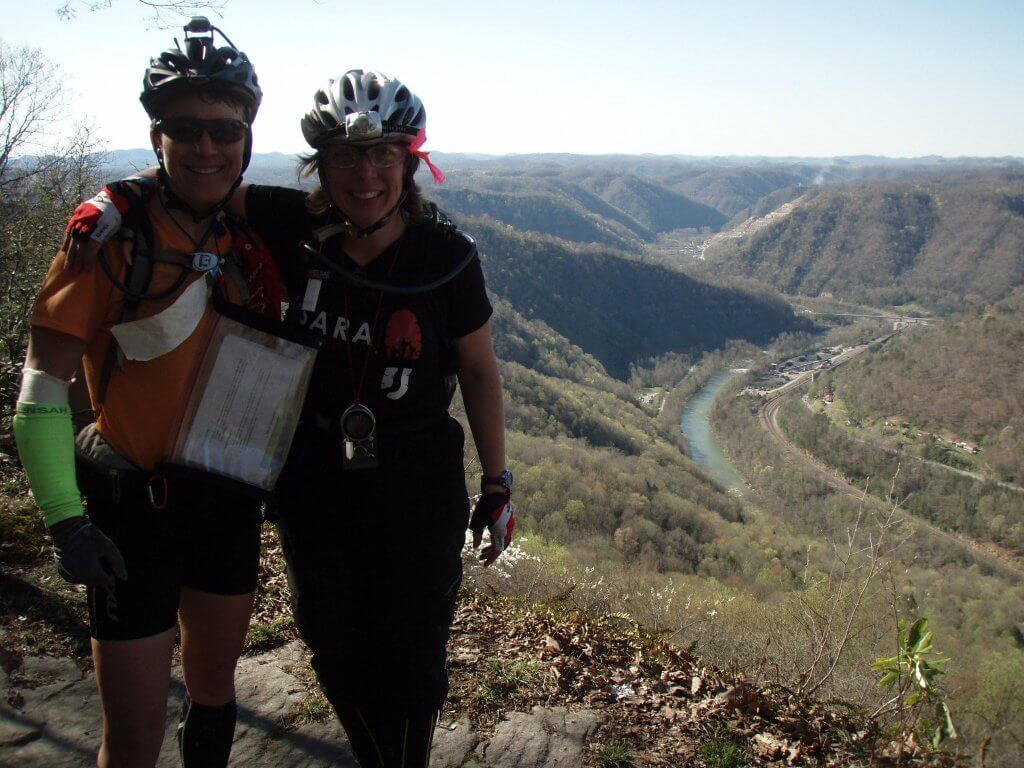
Speaking of, what is your current involvement with adventure racing? Obviously you orienteer a lot but you kept your adventure racing roots I take it.
Yeah, I’ve still got a foot pretty firmly planted in AR. I’m on the board of the USARA [US Adventure Racing Association] and I’m also the nationals coordinator. So I’m helping organize the US Adventure Racing National Championship. And I’ve been involved with that national championship in one way or another on the organizational side since 2010. So I’ve stayed heavily involved in that. And then to help grow that sport among women I started the Women of AR, which is just an organization that exists on Facebook, basically. It started as a way to try to encourage more all-women teams to go to nationals.
I started in 2017 setting up a scholarship for women who wanted to compete at nationals because we hadn’t had any all-women teams go to nationals before that. So, that has really taken off. And this past year, after we established this Women of AR race team with a big prize for the top women’s team at nationals, then it really blew up. We had 14 all-women teams at nationals this past year which was three times our previous record. So that’s really blown up, and it’s been really cool to see what started as just a Facebook group has really grown in the real world.
Do you think that some of what you do for Women of AR would also apply in the orienteering world?
Yeah, it’s interesting because I think one of the biggest challenges to getting women into the sport of AR is the navigation piece. So I think that if we could take some of those ideas and apply them to orienteering and get more women orienteering then we could also get more women adventure racing. And I’m really happy for women to do either one.
My passion about it is getting women back into the outdoors. And that kind of comes from I guess my AR origin story which was I spent my 20s basically really overweight. I drank like a fish and smoked like a chimney as they say. And by the time I hit 30, I was just like a poster child for unhealthy living. So, 30 was kind of a big turnaround point in my life. I think just when I hit that age and I weighed over 200 lb, I said, “Okay, this is not a good trajectory for me.”
And so it was turning that around, from a health perspective, and starting to live a healthier lifestyle that I ended up running and then I ended up adventure racing. And so it all kind of led from there. But it’s because I felt like I basically wasted my 20s inside a bar that I feel so passionately about helping other women get back outdoors because to me that’s what really was special about all those lifestyle changes.
A lot of people will look at the weight loss and the fact that I stopped smoking and those were all big, key things, but for me, what was really life-changing about it was it got me back outdoors. And so I feel really passionately about helping women find their own adventures outdoors. And for me, that’s been orienteering and adventure racing. So that’s naturally where I want to take women because I think both sports are really empowering. I think they really have been key to reconnecting me with nature and obviously I think they’re really special sports and they offer a lot.
So, yeah, I think if we could get some of the things that we’ve done with the Women of AR group, one of the things in particular that would probably translate well into the orienteering space has been an ambassador program. The idea of it is we had women apply to be ambassadors and then we selected eight from around the country. We really tried to focus on geographic diversity and other types of diversity in who we selected. They are how we are taking this from a group that lives on Facebook to the real world.
One of our most successful events from one of our ambassadors up in New York, Shea Coleman, she organized an event that was Orienteering for Trail Runners. And that’s what she called it, Orienteering for Trail Runners. And she had 60 people come to this event!
That sounds great.
Yeah, it’s fantastic.
So, as someone with feet firmly planted in both adventure racing and orienteering, what about the view each one has of the other? Obviously not everyone who likes orienteering would like adventure racing and vice versa, but what would you say?
What would I tell orienteers about adventure racing? It’s that if you orienteer and you go do an adventure race, you’re already well ahead of 75% of the field just because you know how to navigate. So, you know, it can be intimidating adventure racing because of the mountain biking and the paddling component, and the gear requirements. There are a lot more barriers to entering for adventure racing than there are to orienteering, but it’s super fun because you have opportunities to let your brain rest for a little bit, whereas with orienteering, it’s so intense while you’re orienteering. You can’t really let your brain rest.
With adventure racing, you have plenty of opportunities to let your brain rest and you get to actually enjoy more of the scenery around you. With orienteering, it’s often really hard to enjoy the scenery and the terrain where you are because you’re staring at your map and you’re just not taking the time to be able to look around. Whereas, if you’re in an adventure race and you’re paddling down the Shenandoah River, you have plenty of opportunity to look at the scenery around you. And if you’re adventure racing, if you’re doing it with a team, there’s that whole dynamic and aspect that’s different and it’s a way to enjoy a place with other people in a really special way.
You bond with adventure racing teammates like nobody else, and that’s a really cool part of the sport.
Probably one of the biggest distinguishing characteristics between the two, right? And if that’s what you really love, especially in North America, you won’t get that.
Yeah.
And do you encourage adventure racers to try traditional orienteering?
Absolutely.
Yeah. I mean, one of the things I really love is whenever you see in the adventure racing discussion forums or any of the groups or pages on Facebook, whenever you see a new person hop on and say, “Hey, I’ve heard about adventure racing, I want to get started. What do you recommend?” Ninety percent of the people who respond will say something about “find your local orienteering club.” And it makes me so happy to see because it’s true, I mean, the navigation component of adventure racing is the thing that is going to help you succeed more than any other thing you can do. And so, how do you learn to navigate? Go find your local orienteering club.
Because where else can you go and find experts in the sport that you want to pursue who are willing to tell you everything they know for absolutely free and then, maybe they’ll charge you 10 bucks to go do their race afterwards.
Orienteering is the best deal out there, right?
Right. Yeah, absolutely. I don’t think we always realize how good we’ve got it.
All right. I should have maybe asked you this earlier, and it’s maybe the least interesting thing, but what do you do outside of orienteering?
Oh yeah, that is the least interesting thing!
That’s not to say that you’re boring, but we’re primarily interested in orienteering here. However, it’s also nice to see you have a life outside of this. Not all of us do, but you do, right?
That’s only because no one pays me enough to maintain a household to orienteer and adventure race. If I could orienteer and adventure race professionally, that’s exactly what I would do with my life. But as it is, I have to be an attorney because that’s what pays my mortgage.
And what kind of attorney are you?
I do insurance defense work. Yeah. Not only is my job boring, but I practice in one of the most boring fields that you can imagine, which is insurance defense. Actually, it’s not true. It’s not boring. That’s not true.
It doesn’t sound boring to me.
It’s true. I defend workers compensation claims. And so basically people who get injured and sue their employer or who don’t get injured but say they did and sue their employer, I represent the employer. And so it’s actually pretty interesting day in and day out.
Is there anything else you want to share?
Yeah. When I talked about this being the thing that Ben and I do, it’s not merely going to events but also volunteering for Orienteering Cincinnati. To me volunteering and being an active member of the club is part of being an orienteer. I would just encourage people, number one, it just makes the experience that much more enjoyable. We went to the Georgia Navigator Cup last week and we had such a terrific weekend because in between racing, we were going to dinner with friends from the club and friends from other clubs and we were playing games and all of those things around the race itself that we enjoy because we know people in the community.
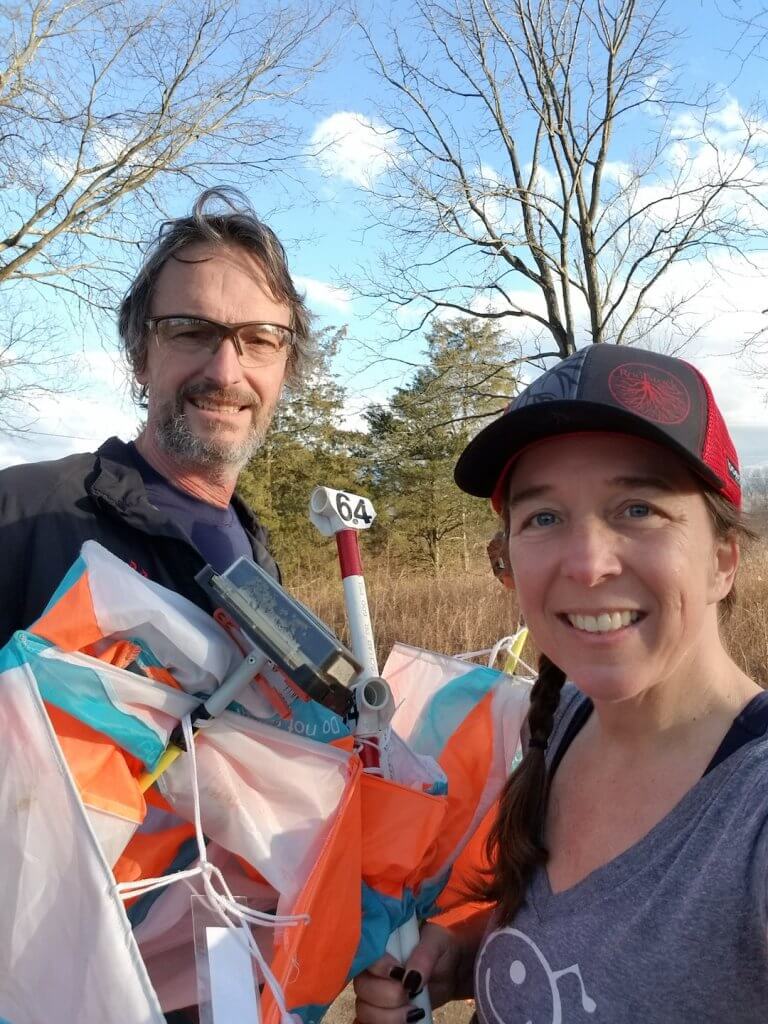
So, you’re going to feel a lot more connected to the orienteering community if you volunteer. And I think it’s your civic duty. If you enjoy orienteering or adventure racing, then you owe it to the race directors and to your club, especially if orienteering clubs aren’t making money. It’s not like they’re paying anyone to go out there and put on these events. We’re all volunteers, and the events don’t happen without volunteers. So, I strongly encourage everyone to do it, not only because it’s a great way to enjoy yourself more when you go to events and to feel connected to the community, but because you owe it to them.
I’m glad you had both sides of that. I also find that it’s fun to volunteer because orienteering is a kind of a lonely sport. And other than comparing routes afterwards, another way that you can actually make it social is by being part of the crew that helps out. Right? We don’t have the teams on the course so much like adventure racing but you can be part of a team doing stuff and that’s fun.
All right, I’m curious what you have lined up this year on your schedule.
Definitely coming back to Southwest Spring Week and we are going to World Masters in Spain. And looking forward to making a trip of that. That has become our big vacation each year, going to World Masters which is in Europe most years, and so that becomes our big vacation. Last year we went to the Pacific Northwest Orienteering Festival. That was our big vacation. But, we’ve gotten into the practice of taking two weeks and going to a big orienteering event and then we either go early or stay late and do some touring and touristy stuff around that. And it’s become a really great way to travel. It’s a great way to build a vacation and see new places and places in ways that you wouldn’t otherwise. That’s the other amazing thing about orienteering. You know, we went to Latvia. Latvia was never going to be on our list of places that we would go to. We went to Latvia because that’s where World Masters was, whatever year. It was an incredible country. We loved Riga. And not only do you get to see a country that you might not have thought of going to, but you see it in a way that nobody else sees. When you go orienteering, you get to go to the places that tour guides are never going to take you to.
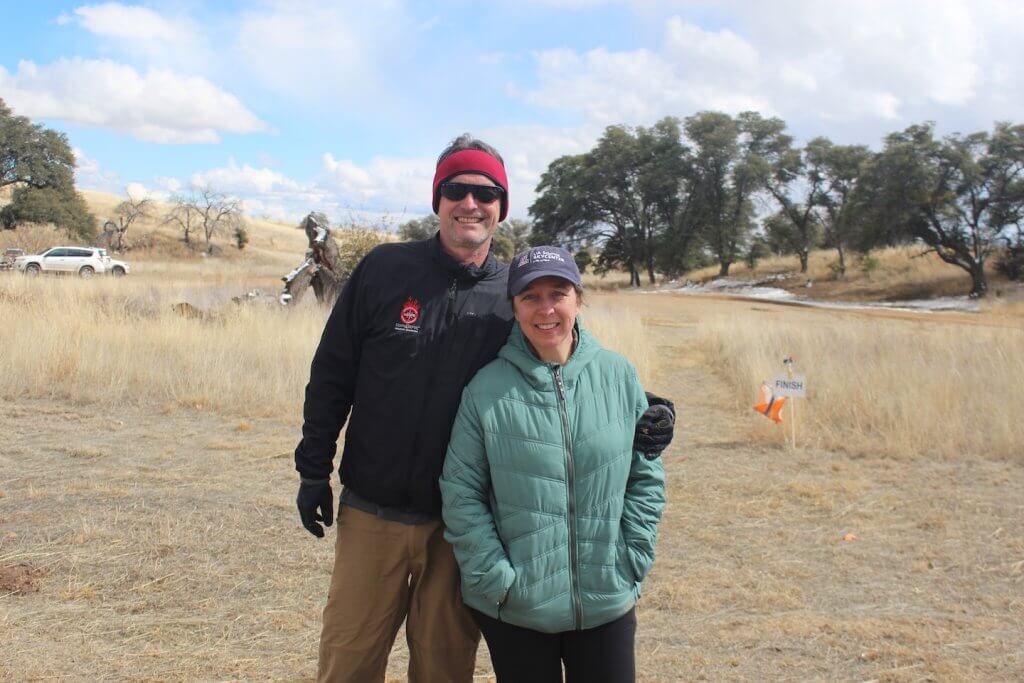
I mean, even locals haven’t been to some of the places you’ll go to, right?
Exactly. So, we’re excited that World Masters is in Spain this year and it’s up in the northeast corner of Spain near the border of France in the Pyrenees area. So, we’re going to spend some extra time and do some touring around the Pyrenees with that. And World Masters, for anybody who doesn’t know about that, you’ve got to be 35 to be competing.
Even if you don’t fit within that category, you can still go and do the recreational courses. And I also want to emphasize that just because it’s called World Masters Championships or US Masters Championships or whatever, it doesn’t mean that you’ve got to be a World Champion to go do it. I mean, Americans across the board, we just are not competitive on the level of the Scandinavian countries and a lot of the European countries. But that’s okay. I mean, it doesn’t matter to me that I’m going to be in the bottom third every single time, right? You just check your expectations. And that’s not what it’s about.
What to me World Masters is about is seeing people out there in the 100 plus age group. The oldest runner at any World Masters we’ve been to was a Norwegian man. He was 103. And he’s still out there orienteering. And what’s really cool and inspiring is to see some of these people in these really advanced age groups who are going out there and doing whatever it takes to still go orienteer. So for example, there was a 90 plus woman from Finland, Sole was her name, and she was going out there. She had one of these huge magnifying glasses like the Sherlock Holmes magnifying glasses that you would hold.
Like a caricature of a magnifier.
Exactly. It was enormous. And she would take that out there to read her map to go orienteer. And there was another man that we saw in the 80 plus age group. And I saw him take off from the start line. He was using a cane and I thought, he probably in his younger days was a really fast, competitive orienteer. And here he is saying, I don’t care that I can’t compete at that level anymore. I don’t care that I need a cane to go out and orienteer. If that’s what it takes for me to still be doing this in my 80s and 90s, then that’s what I’m going to do. And I just find that so inspirational.
I’m fighting with my dad to use a cane so that he doesn’t fall and injure himself as he’s going from home to work, and here are these people saying, “If it takes a cane for me to go out there and still orienteer, I’m going to be humble enough to go do that.” And I get choked up. I literally will have tears in my eyes standing at World Masters watching these people cross the finish line. And it’s such a really cool unique experience to see, because you go to one of those events and there are three or four thousand runners at and at the Masters Championship you’re talking about three or four thousand people aged 35 and older all the way up into their 90s and 100s.
That’s just so inspiring and makes you want to just keep moving.
And they do a really good job at World Masters of staggering the age group finishes, it’s a real showcase of how much of a lifetime sport orienteering is.
Yeah, it’s really cool being able to honor those runners and cheer for them as they come in. It’s super special.
